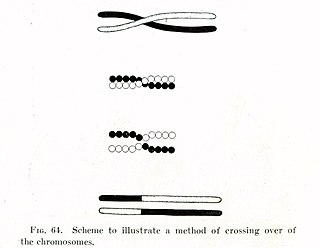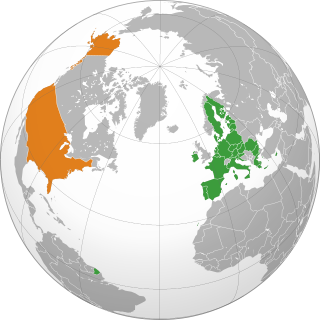Related Research Articles
The General Agreement on Tariffs and Trade (GATT) is a legal agreement between many countries, whose overall purpose was to promote international trade by reducing or eliminating trade barriers such as tariffs or quotas. According to its preamble, its purpose was the "substantial reduction of tariffs and other trade barriers and the elimination of preferences, on a reciprocal and mutually advantageous basis."
The General Agreement on Trade in Services (GATS) is a treaty of the World Trade Organization (WTO) which entered into force in January 1995 as a result of the Uruguay Round negotiations. The treaty was created to extend the multilateral trading system to service sector, in the same way the General Agreement on Tariffs and Trade (GATT) provides such a system for merchandise trade.

In evolutionary genetics, Muller's ratchet is a process which, in the absence of recombination, results in an accumulation of irreversible deleterious mutations. This happens because in the absence of recombination, and assuming reverse mutations are rare, offspring bear at least as much mutational load as their parents. Muller proposed this mechanism as one reason why sexual reproduction may be favored over asexual reproduction, as sexual organisms benefit from recombination and consequent elimination of deleterious mutations. The negative effect of accumulating irreversible deleterious mutations may not be prevalent in organisms which, while they reproduce asexually, also undergo other forms of recombination. This effect has also been observed in those regions of the genomes of sexual organisms that do not undergo recombination.
In international economic relations and international politics, most favoured nation (MFN) is a status or level of treatment accorded by one state to another in international trade. The term means the country which is the recipient of this treatment must nominally receive equal trade advantages as the "most favoured nation" by the country granting such treatment. In effect, a country that has been accorded MFN status may not be treated less advantageously than any other country with MFN status by the promising country.

Containment was a geopolitical strategic foreign policy pursued by the United States during the Cold War to prevent the spread of communism after the end of World War II. The name was loosely related to the term cordon sanitaire, which was containment of the Soviet Union in the interwar period.

A ratchet is a mechanical device that allows continuous linear or rotary motion in only one direction while preventing motion in the opposite direction. Ratchets are widely used in machinery and tools. The word ratchet is also used informally to refer to a ratcheting socket wrench.
The Uruguay Round was the 8th round of multilateral trade negotiations (MTN) conducted within the framework of the General Agreement on Tariffs and Trade (GATT), spanning from 1986 to 1993 and embracing 123 countries as "contracting parties". The Round led to the creation of the World Trade Organization, with GATT remaining as an integral part of the WTO agreements. The broad mandate of the Round had been to extend GATT trade rules to areas previously exempted as too difficult to liberalize and increasingly important new areas previously not included. The Round came into effect in 1995 with deadlines ending in 2000 under the administrative direction of the newly created World Trade Organization (WTO).

The South Asian Free Trade Area (SAFTA) is a 2004 agreement that created a free-trade area of 1.6 billion people in Afghanistan, Bangladesh, Bhutan, India, the Maldives, Nepal, Pakistan and Sri Lanka with the vision of increasing economic cooperation and integration.
The Multilateral Agreement on Investment (MAI) was a draft agreement negotiated in secret between members of the Organisation for Economic Co-operation and Development (OECD) between 1995 and 1998. It sought to establish a new body of universal investment laws that would grant corporations unconditional rights to engage in financial operations around the world, without any regard to national laws and citizens' rights. The draft gave corporations a right to sue governments if national health, labor or environment legislation threatened their interests. When its draft became public in 1997, it drew widespread criticism from civil society groups and developing countries, particularly over the possibility that the agreement would make it difficult to regulate foreign investors. After an intense global campaign was waged against the MAI by the treaty's critics, the host nation France announced in October 1998 that it would not support the agreement, effectively preventing its adoption due to the OECD's consensus procedures.

A ratchet effect is an instance of the restrained ability of human processes to be reversed once a specific thing has happened, analogous with the mechanical ratchet that holds the spring tight as a clock is wound up. It is related to the phenomena of featuritis and scope creep in the manufacture of various consumer goods, and of mission creep in military planning.
The Agreement on Agriculture (AoA) is an international treaty of the World Trade Organization. It was negotiated during the Uruguay Round of the General Agreement on Tariffs and Trade, and entered into force with the establishment of the WTO on January 1, 1995.

The WTO Ministerial Conference of 1999 was the third Ministerial-level meeting of the World Trade Organization, convened at the Washington State Convention and Trade Center in Seattle, Washington, USA, over the course of four days, from Tuesday, 30 November 1999 to Friday, 3 December 1999. Anti-globalization activists organized large-scale protests of the meeting, sometimes known as the Battle of Seattle. Direct action tactics forced the WTO Ministerial Conference to begin late on 30 November and contributed to the meeting ending without agreement on 3 December.
The Mainland and Macau Closer Economic Partnership Arrangement, or Closer Economic Partnership Arrangement (CEPA) for short, is an economic agreement between the Government of the Macau Special Administrative Region and the Central People's Government on October 18, 2003. A similar agreement, known as the Mainland and Hong Kong Closer Economic Partnership Arrangement, was signed between the Government of the Hong Kong Special Administrative Region and the Central People's Government of the People's Republic of China, signed on June 29, 2003.
Labour standards in the World Trade Organization are binding rules, which form a part of the jurisprudence and principles applied within the rule making institutions of the World Trade Organization (WTO). Labour standards play an implicit, but not an overt role within the WTO, however it forms a prominent issue facing the WTO today, and has generated a wealth of academic debate.

The Transatlantic Trade and Investment Partnership (TTIP) was a proposed trade agreement between the European Union (EU) and the United States, with the aim of promoting trade and multilateral economic growth. According to Karel de Gucht, European Commissioner for Trade between 2010 and 2014, the TTIP would have been the largest bilateral trade initiative ever negotiated, not only because it would have involved the two largest economic areas in the world but also "because of its potential global reach in setting an example for future partners and agreements".

The Cross-Strait Service Trade Agreement, commonly abbreviated CSSTA and sometimes alternatively translated Cross-Strait Agreement on Trade in Services, is a treaty between the People's Republic of China and the Republic of China (Taiwan) that was signed in June 2013. However, it was never ratified by the Taiwanese legislature due to opposition from the Sunflower Student Movement, which rejected the CSSTA on the grounds that the Kuomintang (KMT) leadership in Taiwan negotiated and attempted ratification of the treaty in an undemocratic way.

The Trade in Services Agreement (TiSA) was a proposed international trade treaty between 23 Parties, including the European Union, United Kingdom and the United States. The agreement aimed at liberalizing the worldwide trade of services such as banking, healthcare, and transport. Criticism about the secrecy of the agreement arose in June 2014, after WikiLeaks released a classified draft of the proposal's financial services annex, dated the previous April. Another release took place in June 2015, and another took place in May 2016. As of 2021, no such agreement has ever been reached.

Georgia–Hong Kong relations are bilateral relations between Georgia and Hong Kong.

Hong Kong–Maldives relations refer to foreign relations between Hong Kong and the Maldives.
The European Union's (EU) Common Commercial Policy, or EU Trade Policy, is the policy whereby EU Member States delegate authority to the European Commission to negotiate their external trade relations, with the aim of increasing trade amongst themselves and their bargaining power vis-à-vis the rest of the world. The Common Commercial Policy is logically necessitated by the existence of the Customs Union, which in turn is also the foundation upon which the Single Market and Monetary Union were later established.
References
- ↑ Mechanisms for standstill, rollback and listing of country specific reservations Page 3 of note by MAI Negotiating Group chairman, OECD, 15 February 1996